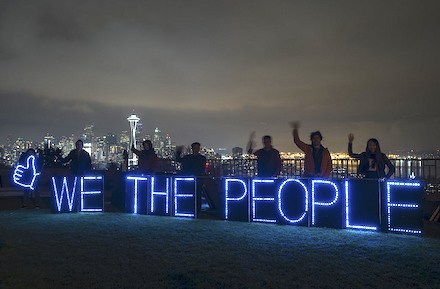www.aljazeerah.info
Opinion Editorials, May 2019
Archives
Mission & Name
Conflict Terminology
Editorials
Gaza Holocaust
Gulf War
Isdood
Islam
News
News Photos
Opinion Editorials
US Foreign Policy (Dr. El-Najjar's Articles)
www.aljazeerah.info
The Rise of Popular Democracy in the 21st Century By Graham Peebles Redress, Al-Jazeerah, CCUN, May 15, 2019 |
 |
 |
|
The rise of popular democracy
In 1975 just 46 countries were considered to be electoral democracies. Forty years later, according to the Global State of Democracy report 2017, the number had risen to 132, accounting for 68 per cent of nations.
The bulk of the increase occurred after 1989 following the collapse of the Soviet Union and what was to be the beginning of the global protest movement. While holding general elections every five years or so is an important step away from the autocratic alternative, unless democratic values are embraced and introduced true democracy remains little more than a slogan, social injustice and suppression in various forms continue and concentrations of power persist.
Although the number of electoral democracies continues to increase, throughout the world, democracy is in crisis; governments have become increasingly partisan, populism and extremism of all stripes have flourished, and people have lost confidence in democratic institutions asthe means of solving the various crises confronting us. Politicians are viewed with suspicion or outright contempt, regarded as ambitious, ideologically-compromised men and women with little concern for the majority, who make policy based on self-interest and party doctrine.
Democracy has been hijacked by “the economy” – twinned with capitalism and the “free market”, and corrupted thereby. Democracy is, or should be, a living organism, an evolving form that sets the parameters within which society functions, based on principles that are rooted in, and cultivate expressions of, unity and love.
The democratic ideal seeks to guarantee basic freedoms, establish social justice and equality, and ensure government accountability. It recognises that human beings are equal, diverse but united, that their needs are universal and that meeting these needs is a right not a luxury. True democracy cannot exist where the ideology of commercialisation, consumerism and greed resides. The crisis in democracy is inextricably linked to the socio-economic crisis; changes in one will trigger a revolution in the other. And this process is well underway.
Collective action
Despite the decline in civil liberties and deep disillusionment with the functioning of governments throughout the world, various studies, including the Economist Intelligence Unit’s Democracy Index 2018 has found that political participation is significantly increasing. Exasperation with politicians and institutions together with an intense desire for fundamental change has impelled huge numbers to unite and act. People, particularly the young, are engaging, joining political parties, taking part in demonstrations and online activism, signing petitions or joining local community groups.
This surge in democratic participation represents a major shift in attitudes, a new collective consciousness that tends towards unity and cooperation, and offers hope – not hope based on a distant belief that someone else, a government, institution or God will make all things new; such are the ways of apathy and self-deceit – but hope anchored in action, in committed consistent engagement.
Ignorance, complacency and fear are fertile ground for propaganda; they are the friends of the duplicitous politician and the enemy of the people and common sense – a much-underrated quality.
At the heart of many of the protest movements that have swept the world since the Berlin Wall came down is democracy: demanding democracy where none exists, as was the case with the Arab uprisings of 2011… and more recently in Algeria, Sudan and Ethiopia, or in countries broadly aligned with democratic principles; calling for a deepening of democracy and the opening up of structures and institutions; and for the voice of the people to be heard and concerns acted on.
As more people engage and the power of popular democracy grows, democratic platforms for engagement, such as Citizens’ Assemblies, will become increasingly relevant. In early 2018 the UK government commissioned a Citizens’ Assembly to discuss social care: 47 individuals chosen at random, and, with the support of experts spent two weekends discussing the subject. At the end of their deliberations a report was sent to the government and their views helped fashion government proposals.
In order for the collective voice to have increasing influence, people need to be educated about the issues of concern – this is an act of democratic responsibility. A well-informed populace free from ideological allegiance is required in order to reach views free from bias and prejudice, and contribute to discussions with decision makers. Ignorance, complacency and fear are fertile ground for propaganda; they are the friends of the duplicitous politician and the enemy of the people and common sense – a much-underrated quality.
Sharing, participation and responsibility
Within the evolving democratic environment the role of politicians as co-workers, as collaborators for the common good, becomes ever more important. They need to engage with activists, listen – not to the loudest flag-waving faction, not just to their own supporters, but to the broad consensus, and respond, and not, as has historically been the case, reluctantly and over decades, but swiftly and whole-heartedly. A positive example of this is the decision by the Scottish parliament to declare a climate emergency in response “to young protesters who went on strike from school to urge action”. The declaration of a climate emergency by governments has been a key demand of environmental campaigners, including Extinction Rebellion (which held huge, peaceful protests in London for two weeks recently), for some time.
Announcing the step on 29 April, Scotland’s first minister, Nicola Sturgeon said:
"they [environmental activists] want governments around the world to declare a climate emergency. They say that’s what the science tells us, and they are right… I am declaring that there is a climate emergency and Scotland will live up to our responsibility to tackle it."
The UK parliament followed Scotland’s example on 1 May, making it the first national legislature to declare a climate emergency.
Democracy is not in decline, as some believe; like all existing systems – social, economic, political and religious – democracy in its current form is inadequate to the challenges and the nature of the present time, and is being fundamentally challenged. Democratic forms need to change, to be allowed to evolve – to be re-imagined. Crucially, democracy needs to be unshackled from economics and the socio-economic system re-examined in light of the growing demands for social justice, environmental action and freedom.
The principle of sharing is a core democratic ideal that, if incorporated into all areas of life, would allow democratic values to be made manifest: students sharing in the organisation of schools and the design of curricula; employees sharing in the management and standards of businesses; sharing animating the socio-economic systems under which we all live and colouring geopolitical decisions. Sharing, responsibility and participation are interrelated; they sit together and reinforce one another. An unstoppable movement of change is being created by the growing inculcation and expression of these democratic principles; a momentum that may just be strong enough to save the planet and usher in a new and just way of living.
https://www.redressonline.com/2019/05/the-rise-of-popular-democracy/
***
Share the link of this article with your facebook friends
|
|
|
|
||
|
||||||


